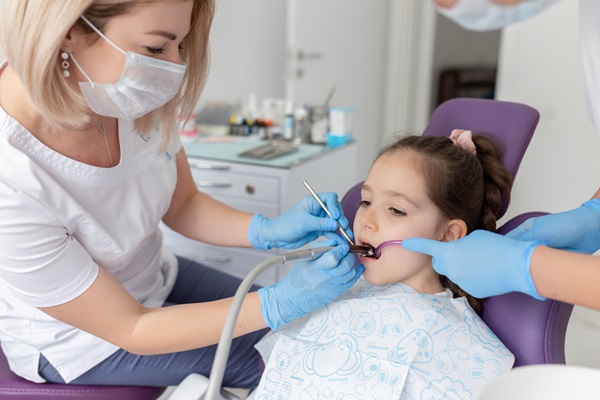Should My Child Get Dental Sealants?

Dental sealants are thin plastic coats that are applied to the biting surfaces of a person's teeth. They can be used on any tooth, but they are mostly used on the premolars and molars because these are the most susceptible to tooth decay. When applied, the sealant adheres to the pits and grooves on the person's teeth, forming a layer of protection over the enamel.
Brushing and flossing are effective ways to remove food particles and plaque from teeth surfaces, but it can be difficult to clean all the grooves on the teeth that are in the back of the mouth. Getting the bristles of a toothbrush to these areas or flossing them properly takes skill.
Children do not always have the required brushing and flossing expertise to keep these areas adequately cleaned, which makes their teeth susceptible to decay. Primary, or milk, teeth are just as important as permanent teeth. Milk teeth hold the place of the permanent teeth that come after them, and one falling out early can lead to teeth alignment issues. Dental sealants can be used to protect these areas and prevent food particles and bacteria from accumulating on them.
Why dental sealants are great for children
Children and teenagers are more likely to deal with tooth decay on their molars and premolars, making them great candidates for dental sealants. These are also recommended for adults who are vulnerable to tooth decay.
Dentists recommend getting dental sealants for children as soon as their permanent premolars and molars erupt. This gives the child an increased level of protection during the years that they are most susceptible to decay (ages 7-14) Dental sealants can also be safely applied to baby teeth. This is usually done if the tooth has deep grooves and depressions, as it is easy for bacteria and food particles to build up in these spaces.
What to expect when getting dental sealants applied
Getting dental sealants on a person's teeth is a painless and quick process. It only takes minutes for a dentist to paint the sealant on the biting surfaces of the teeth being treated. The process looks like this:
- The patient's teeth are cleaned and dried, and an absorbent material like cotton is put around the tooth to help maintain the dryness
- An acid is used to roughen up the surfaces of the patient's teeth; this process is known as etching, and it makes it easier for the sealant to stick to the teeth that it is applied to
- The patient's teeth are rinsed and dried again
- The sealant is painted on the patient's teeth using a brush, and it hardens on the tooth's surfaces when exposed to air; in some cases, a curing light is used for this
Frequently asked questions about dental sealants
Many patients can benefit from dental sealants. Let us go over a few of the questions that they might have.
What are dental sealants?
Dental sealant is a type of coating that is applied to the teeth. It acts as a barrier, preventing food and bacteria from getting stuck in the grooves of the teeth and causing cavities.
Are dental sealants safe?
Yes, dental sealants are considered to be safe. They are made from materials compatible with the human body and have been extensively tested for safety and efficacy.
How long do dental sealants last?
Dental sealants can last several years, but they will eventually need to be replaced. The exact lifespan of a dental sealant will vary depending on the individual’s habits (such as how much they brush their teeth) and the type of sealant used. Most people can get a few years out of dental sealants.
Are dental sealants effective?
Yes, dental sealants are an effective way to prevent cavities. They have been shown to reduce the incidence of cavities by up to 80%, according to the CDC.
Do all dentists recommend dental sealants?
Not all dentists recommend dental sealants, but many do. The American Dental Association recommends that sealants be applied to the teeth of children and adolescents who are at high risk for cavities.
What are the benefits of dental sealants?
Dental sealants offer several benefits, including:
- Reduced risk of cavities
- Preservation of tooth structure
- Reduced need for fillings
- Reduced risk of tooth decay
What are the drawbacks of dental sealants?
Dental sealants do have a few drawbacks, including:
- They can only be applied to teeth that are free of cavities
- They are not permanent and will ultimately need to be replaced
- They may not be covered by dental insurance
Sealants can protect teeth for up to a decade!
According to the International Journal of Pediatric Dentistry, dental sealants can keep decay at bay for at least 10 years. It can protect you and/or your child for even longer if you regularly get it touched up. Stop by our clinic to learn more about this preventative dental treatment.
Request an appointment here: https://nettsmiles.com or call Nett Pediatric Dentistry & Orthodontics at (623) 759-7658 for an appointment in our Phoenix office.
Check out what others are saying about our dental services on Yelp: Dental Sealants in Phoenix, AZ.
Recent Posts
Children are highly susceptible to tooth decay or cavities. However, that does not mean they are bound to get a cavity. Opting for a dental sealant for kids can help prevent cavities by shielding the teeth from bacteria. This protection can last for years. If you are a parent concerned about your child’s dental problems,…
Dental sealants for kids protect the chewing surface of the back teeth from cavities. These are the areas that are often most vulnerable to teeth decay in children, and sealants can help prevent the need for cavity fillings in the future, which are all too common among children. This review discusses situations when a pediatric…
Dentists often recommend dental sealants for children as a way to protect the teeth from cavities or wear and tear. Oftentimes, they are applied to the baby teeth so that they remain healthy until the adult teeth take over. After the adult teeth come in, the dentist may want to reapply in order to set…
Preventive dentistry is a valuable component of your child’s oral health. Young teeth need the highest level of protection. Providing treatments that will keep your child’s teeth and gums healthy will elevate your child’s formative years. Here are the details about the role of preventive dentistry in your child’s oral health.Digital dental X-rays are part…


